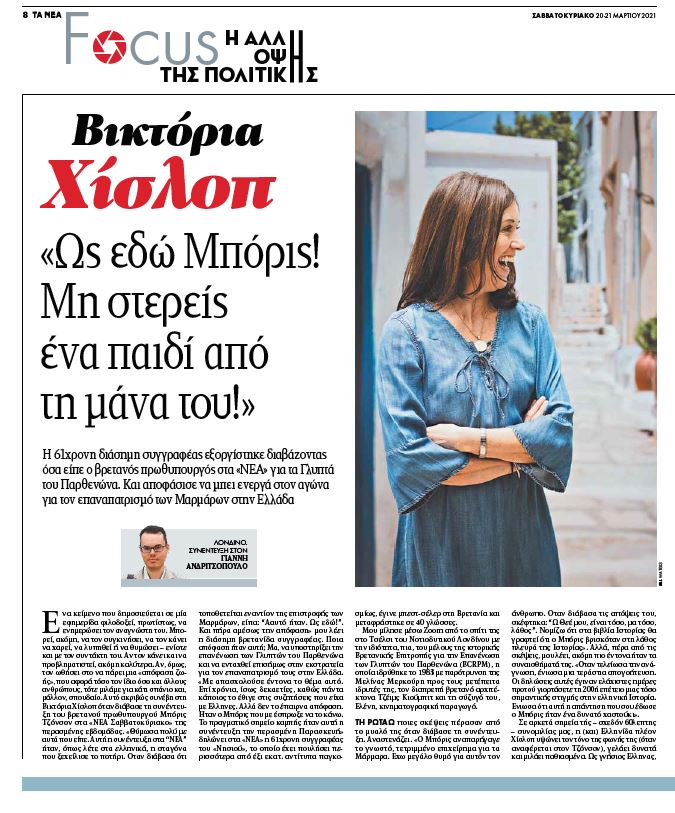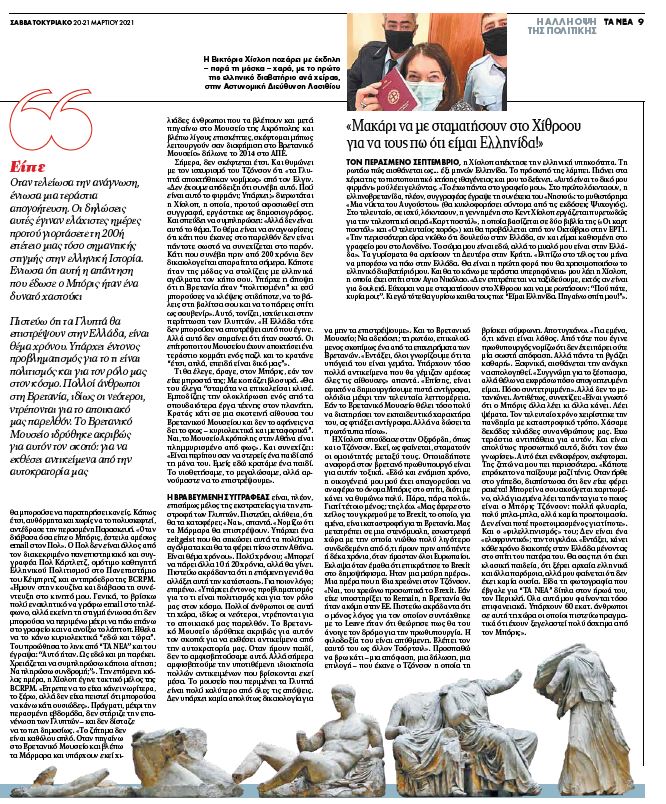Victoria Hislop, novelist and activist, was granted honorary Greek citizenship in July 2020 for promoting modern Greek history and culture.
This was a richly deserved reward for above all a trilogy of novels with Greek themes that bring out the trials, tribulations and sometimes triumphs of modern Greek communities ranging from Crete to Thessaloniki to (Greek) Cyprus. The Island (2005) was her breakout account of the use of the islet of Spinalonga (Venetian name) off north-eastern Crete as a receptacle for leprosy victims. The Thread (2011) traced the Asia Minor catastrophe of the 1920s through to its further consequential disaster - the destruction of the Jewish community of Thessaloniki by the Nazis. Finally, The Sunrise (name of a hotel in Famagusta/Turkish Varosha) explored the disaster of the 1974 Turkish occupation of 'northern' Cyprus via the fictionalised but fact-based stories of some conflicted and displaced Greek families. Overtones of ancient Greek tragedy were clearly discernible. Others of her works have Greek, especially Cretan, settings or associations. For many years she had been made uncomfortable by the British Museum's intransigent attitude to 'their' Marbles: the recent interview of the Prime Minister by Yannis Andritsopoulos (Ta Nea) pushed her finally over the edge and, happily, into the embracing arms of the Reunification camp.

20 March 2021, in Ta Nea, an exclusive interview by Yannis Andritsopoulosn exclusive interview by Yannis Andritsopoulos:
When Victoria Hislop read Boris Johnson’s interview with Greek newspaper Ta Nea a few days ago, she was furious.
The award-winning British author says it prompted her to grab her phone, send an email and join the campaign for the return of the Parthenon Marbles to Greece.
It was a move she had been contemplating for years but her mind was made up in an instant by the British Prime Minister’s words.
“I've been thinking really deeply about the whole issue. It seems like decades somehow, because it always comes into conversation with Greeks,” the acclaimed writer told Ta Nea.
“But the actual tipping point was reading this interview with Boris Johnson in Ta Nea last Friday,” she added.
Lord Elgin, ambassador of Great Britain to the Sublime Porte, removed the 2,500-year-old sculptures from the Parthenon temple in Athens in the early 19th century, when Greece was under Ottoman rule.
In his first interview with a European newspaper since becoming the UK’s prime minister, Mr Johnson dashed Greece’s hopes of getting the Marbles back, saying that they were “legally acquired by Lord Elgin under the appropriate laws of the time and have been legally owned by the British Museum’s Trustees since their acquisition.”
“It was the same, tired statement, now made by Boris. I suppose I have extremely deep and personal anger towards Boris on many issues. Somehow, him coming out against the return of the Marbles was like 'this is it',” says Hislop, whose 2005 bestseller The Island has sold more than 6 million copies around the world and it has been published in 40 languages altogether.
I ask her what her first thought was when she read Johnson’s comments.
“I was like: ‘Oh God, that is absolutely wrong’. I think the history books will show that Boris was on the wrong side of history,” she says.
“This is the 200th anniversary of such a significant moment in Greek history,” she adds, referring to the bicentennial of the Greek War of Independence that Greece is celebrating next week. “I felt like that answer to you is a slap in the face. It felt like that.”
When she finished reading the interview, Hislop, 61, decided it’s high time she joined the campaign for the return of the sculptures.
“It's been very much on my mind now for a long time to join up, but somehow Boris just tipped me right over on Friday. What he said made me angry. This interview with Ta Nea was the last straw,” Hislop recalls.
She subsequently contacted the renowned academic Paul Cartledge, A.G. Leventis Professor of Greek Culture Emeritus at the University of Cambridge, who is also vice-chair of the British Committee for the Reunification of the Parthenon Marbles (BCRPM) and the International Association for the Reunification of the Parthenon Sculptures (IARPS).
“When I read it, I emailed Paul immediately. I was in my kitchen and my laptop was in my study, which is two floors up from the kitchen. I only had my phone in the kitchen. It's really irritating to send emails on your phone; but I didn't even bother to come back up to my laptop. I just wanted to do it literally there and then.”
Hislop sent Cartledge the link to the interview on Ta Nea’s website and wrote: “Typical of Johnson to cite the usual cliché about the Marbles. (…) I think this is my final push to join up.”
Her request to join the committee was approved almost instantly.
Hislop is now a member of the BCRPM, a historic lobby group founded in 1983 by the distinguished British architect James Cubitt and his wife Eleni, a filmmaker, following a discussion the couple had with the then Greek Culture minister Melina Mercouri (one of the most emblematic figures of contemporary Greece) and her husband Jules Dassin, a renowned film director and producer.
“I should have done it before, I know,” she says. “But, you know… It’s that sense - and I don’t want this to sound defeatist - of what can one really do in the face of this very old-fashioned stubbornness. That's what I regard the British Museum slightly being. It’s a great institution, but this stubbornness that they have…”.
Hislop says that Johnson’s claim that the Parthenon Marbles were legally acquired by Lord Elgin is not accurate. “Where is that firman? (the Ottoman document used by Elgin as the basis of proving the supposed legality of the Marbles’ removal) Does it exist?” she asks.
“But… it's to do with recognising that what you did in the past isn't always the right thing for the present. You can't justify something now with what took place 200 years ago,” she adds.
“There was a fashion at the time for putting bits of Greek statues; it was fashionable to have things from the grand tour in your garden. There was an idea that Britain was this civilised place and you could just essentially steal, just take home a souvenir and put it in your luggage more or less. Greece wasn't the country then to have measures to prevent that happening. But it doesn't mean that it was right.”
I ask her what she would say to Boris Johnson if she met him. “I'd say ‘don't just cite the clichés. You're preventing the completion of one of the finest works of art on the planet. You're keeping something in a dark and dreary gallery of the British Museum as opposed to allowing it to see the light’,” says Hislop.
“The Acropolis Museum in Athens is so full of light,” she adds.
“It's like we've got this huge section of a jigsaw and we're just holding it because it's ours. This is something I find naive about still holding that view in 2021.”
Tide turning
Does she think that the Parthenon Sculptures will, eventually, return to their birthplace? Very much so, Hislop assures me.
“I think that the Marbles will return to Greece. It's a question of time. There's a zeitgeist that will sweep these precious things back to Athens.”
“I genuinely do think that the tide will turn with another generation. It might be another 10 or 20 years. This British colonialist attitude is going to seem very, very out of date and very politically incorrect,” she says.
She adds: “Forty years ago there was this sense of those wonderful sculptures that they're somehow better off here in London, that we're looking after them. That excuse is very dated now. The museum which is waiting for them is a way better place in so many ways. There is absolutely no remaining excuse for them not to go back.”
“It's almost like keeping a child from its mother. We're keeping the child. We adopted it, we brought it up but we're not giving it back.”
Hislop went on to explain why, in her view, the Parthenon Marbles could be part of the growing debate over contested heritage and Britain’s colonial past.
“I think that many people in this country, many younger people, people in their 20s, 30s and 40s, are really questioning our colonial past. They don't accept it at all; they are ashamed of it. That's what the British Museum was set up to do; to display things from our empire. When I was a child, we didn't question that. But fifty or sixty years on, we are deeply questioning what such a museum represents and the so-called ownership of many of the things inside.”
Hislop is keen to refute the so-called “floodgates” argument, according to which the return of the Parthenon Marbles could lead to a barrage of other nations' repatriation demands risking emptying the British Museum.
“We all know that the basement of the British Museum is packed. They have got so much stuff that would fill the galleries,” she says, adding that “it is also possible to create absolutely authentic, accurate copies. If the British Museum really wants to keep that as an educational gallery, make absolutely faithful copies but give the original back.”
Boris ban
Hislop reveals that for the last 1.5 years, her own family has banned her “from mentioning Boris in the house because he makes me really angry. I mean, really angry.”
Why is that? I ask her. “He led us over the cliff with Brexit which for me is a catastrophe for Britain. It turns us into this sort of parochial inward-looking country that I feel much less connected with than I did five or ten years ago when we were all European.”
“I wept when that Brexit vote happened,” she says. “I really think it was such a black day when the vote came.”
Hislop says that she “personally blames Boris” for Brexit. “If he had backed Remain, then the UK would still be part of Europe. I genuinely believe that the only reason he took the side that he did in the campaign was that he saw it as a route to becoming prime minister. The depth of his ambition... have no doubt about it. He sees himself as a kind of another Churchill.”
“For me, Boris is wrong on absolutely everything. Whatever he says, I can't agree with in any way whatsoever. Since he became prime minister, I don't think he's made really one good decision. I feel dismayed by him. He always gets away with things,” she adds.
Hislop also thinks that the British prime minister has handled the Covid-19 crisis appallingly. “Boris is very well-known for saying one thing and doing another. He tells lies. He's handled the last year of the pandemic pretty catastrophically. We've lost tens of thousands of people in lockdown. I have a lot of animosity.”
She’s speaking from personal experience, she tells me. “I was once asked to partner him in a tennis match and he turned up without a racket. It's a humorous anecdote, but it says everything about Boris Johnson; that he's all bluster, he's all talk. He is never prepared; I think he is very superficial.”
“He obviously goes to Greece to his father's house every year for holiday and he'll say he's a classicist, he knows Ancient Greek and all of this, but he doesn't actually seem to me to add up to anything.”
Last week, Johnson posed exclusively for Ta Nea next to a bust of Pericles in his parliamentary office in Westminster. “I saw the photograph next to his hero, Pericles; all of that is incredibly skin-deep,” Hislop says.
“We have 60 million people in this country who I feel have all been individually very badly led astray by him. I’m sorry I'm sort of ranting about Boris but it's partly to demonstrate how frustrated and heart-broken I am.”
Being Greek
Hislop was awarded honorary Greek citizenship in September. What does it feel like to be a six-month old Greek, I ask her.
“This is like my firman,” she says, showing me her citizenship certificate (over Zoom). “I keep it in my study.”
During the first lockdown, Hislop wrote her new book One August Night, the sequel to her 2005 bestseller The Island. Over the past few months, including during the UK’s third national lockdown, she has been working from her Chelsea home on the television adaptation of her novels Cartes Postales from Greece and The Last Dance to be released in October by the Greek state broadcaster ERT.
“Most of the time I’m kind of working in Greece although I'm sitting on my desk in London. It’s a strange thing. My body is here but my brain is somewhere else,” she says.
“The filming starts next Monday (in Crete) and I'm hoping to go out at the end of the month. That would be the first time I'm using my Greek passport. And I should be using it with huge pride.”
“We're not really allowed to travel, unless it's for work. I'm slightly hoping that they’ll challenge me at Heathrow and say ‘where are you going, madam?’ And I'll just say ‘I'm Greek, I'm on my way’!”
To read the article in Ta Nea, kindly follow the link here or to read the original article in Greek, access this pdf.

